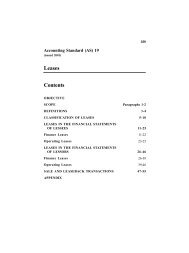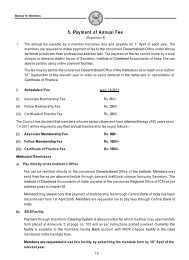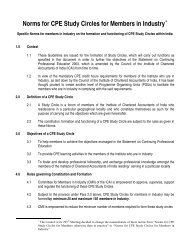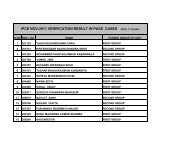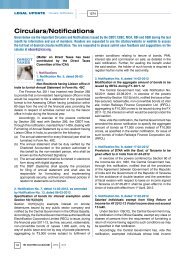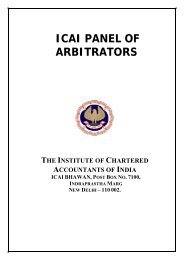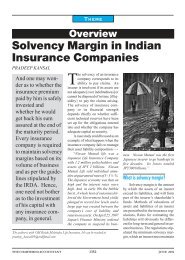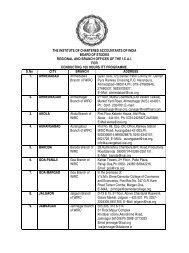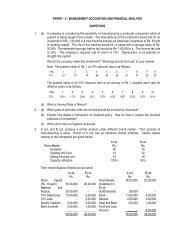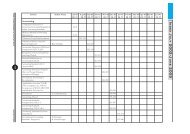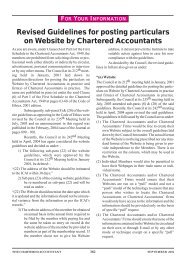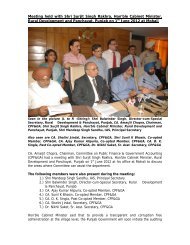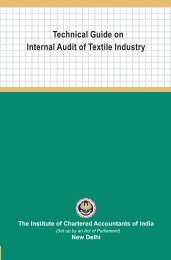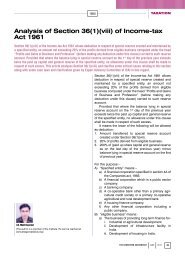The Chartered Accountant
The Chartered Accountant
The Chartered Accountant
Create successful ePaper yourself
Turn your PDF publications into a flip-book with our unique Google optimized e-Paper software.
“Applying the tests laid down in the aforesaid<br />
judgement to the present case, it may<br />
be noted that, in this case, we are concerned<br />
only with the existence and the extent of the<br />
powers given to the Central Government to<br />
make rules, both for altering the Schedules<br />
to the Companies Act as well as to fill in details.<br />
Power to alter the Schedule as well<br />
as power to fill in details are two distinct<br />
powers. However, both the powers are<br />
entrusted to the same delegate, namely,<br />
the Central Government. Further, as stated<br />
above, sections 641 and 642 form part of the<br />
same scheme, hence, it cannot be said that<br />
merely because the impugned notification<br />
has been issued under section 642 and not<br />
under section 641 the said notification is<br />
exhaustive of the powers given to the Central<br />
Government to frame rules under the<br />
aforestated two sections. Moreover, in the<br />
present case, section 642(1) begins with the<br />
expression in addition to the powers conferred<br />
by section 641, therefore, one has<br />
to read section 641 as an additional power<br />
given to the Central Government to make<br />
rules, in addition to its power to alter the<br />
Schedule by making appropriate rules under<br />
section 641. <strong>The</strong>re is one more way of looking<br />
at the arguments. <strong>The</strong> Companies Act<br />
has been enacted to consolidate and amend<br />
the law relating to companies and certain<br />
other associations. Under section 211(3A)<br />
Accounting Standards framed by the National<br />
Advisory Committee on Accounting<br />
Standards constituted under section 210A<br />
are now made mandatory. Every company<br />
has to comply with the said standards. Similarly,<br />
under section 227(3)(d), every auditor<br />
has to certify whether the profit and loss<br />
account and balance-sheet comply with the<br />
accounting standards referred to in section<br />
211(3C). Similarly, under section 211(1) the<br />
company accounts have to reflect a "true and<br />
fair" view of the state of affairs. <strong>The</strong>refore,<br />
the object behind insistence on compliance<br />
with the A.S. and "true and fair" accrual is<br />
the presentation of accounts in a manner<br />
which would reflect the true income/profit.<br />
One has, therefore, to look at the entire<br />
scheme of the Companies Act. In our view,<br />
the provisions of the Companies Act together<br />
with the rules framed by the Central<br />
Government constitute a complete<br />
DECEMBER 2008 968 THE CHARTERED ACCOUNTANT<br />
ACCOUNTING<br />
scheme. Without the rules, the Companies<br />
Act cannot be implemented. <strong>The</strong> impugned<br />
rules framed under section 642 are a legitimate<br />
aid to construction of the Companies<br />
Act as contemporanea expositio. Many of<br />
the provisions of the Companies Act, like<br />
computation of book profit, net profit etc.<br />
cannot be put into operation without the<br />
rule” (Para76 on page 271 of 297 ITR)<br />
“In the present case also even under the<br />
rules impugned herein AS 22, which is made<br />
mandatory, provides an internal legitimate<br />
aid to the meaning of the words in the Companies<br />
Act, including Schedule VI, namely,<br />
liability, provision for taxes on income, book<br />
profit, net profit, depreciation, amortization<br />
etc. <strong>The</strong>refore, it cannot be said that the impugned<br />
rules framed under section 642(1)<br />
constitute an act on the part of the rulemaking<br />
authority, namely, the Central Government,<br />
in exercise of its powers under section<br />
642(1) of the Companies Act. In our view,<br />
the impugned rule/notification is valid. It<br />
has nexus with the matters entrusted to the<br />
Central Government to be covered by the<br />
appropriate rules. <strong>The</strong>refore, in our view,<br />
the impugned rule is valid as it has nexus<br />
with the statutory functions entrusted to the<br />
Central Government which is the rulemaking<br />
authority under the Act...<strong>The</strong> scheme of<br />
the Companies Act indicates that Accounting<br />
Standards are made mandatory. <strong>The</strong>y<br />
have to be followed by the auditors. <strong>The</strong>y<br />
have to be followed by the companies. <strong>The</strong><br />
Accounting Standards provide discipline.<br />
<strong>The</strong>y provide harmonization of concepts.<br />
<strong>The</strong>y provide harmonization of accounting<br />
principles. In the past, when Accounting<br />
Standards were not mandatory, various<br />
companies used to follow alternate system<br />
of accounting. This led to overstatement of<br />
profits. <strong>The</strong>refore, the said Standards have<br />
now been made mandatory. In our view, it<br />
is the statutory function given to the Central<br />
Government to frame Accounting Standards<br />
in consultation with the National Advisory<br />
Committee on Accounting Standards (NAC)<br />
under section 211(3C). It is not necessary<br />
for the Central Government to adopt in<br />
every case the Accounting Standards issued<br />
by the Institute. Nothing prevents the<br />
Central Government from enacting its own<br />
Accounting Standards which may not be in



